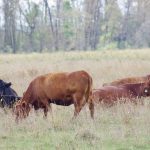
Tag Archives seed varieties

Clubroot resistance: what new seed labels would mean for canola growers
Proposed label changes could provide growers with detailed info to rotate varieties and preserve resistance in canola crops

Producers slow to adopt new pulse varieties
SaskPulse observes varieties fading in popularity and others gaining traction

Finding the right fit: Choose your canola varieties carefully
The best one for your farm might be different than your neighbours’

Fitting malting barley in your rotation
The price premium isn’t the only benefit malting barley offers

New tools could speed up development of cereal varieties
Selection is a business of evaluation, identification — and yes, rejection

Critical factors in growing malting barley
While malting grade offers premiums, farmers must meet stringent quality standards to avoid being left with feed

Essential oils: New Prairie oilseeds for 2025
Details on new sunflowers, mustards and flax

New canola hybrids for 2025
Nineteen more options are on deck for Prairie canola producers

Shop smart when selecting seed for salt tolerance
Soil tests are recommended before deciding how best to manage salinity

Planting just one soybean variety is a ‘mistake’
Growers should try at least three, an Ontario soy expert says


